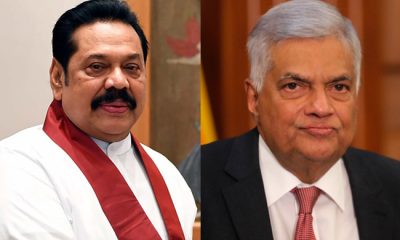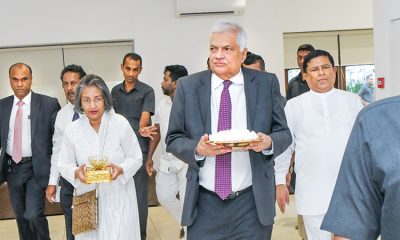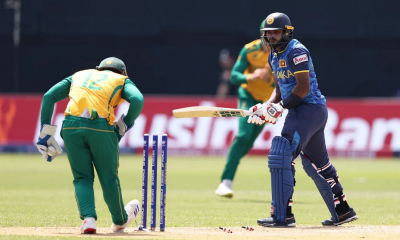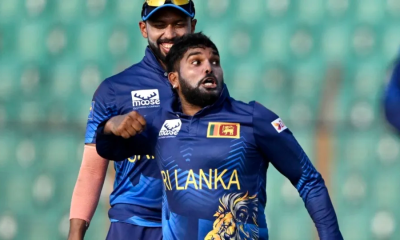Editorial
The presidential race

Although no presidential election is due till November next year, developments in the domestic political field last week brought such an election to be held in the future to public attention. While President Ranil Wickremesinghe has not personally announced his candidature, it is no secret that he desires an elected term with a peoples’ mandate different as chalk from cheese to what he holds at present. Various persons, excluding the Rajapaksas he is widely alleged to be protecting, have made statements that he will be a candidate come 2024, These include spokesmen from his own United National Party as well as some Sri Lanka Podu Jana Pakshaya heavyweights currently serving in his cabinet. Other SLPPers have been ambivalent though none have expressed any degree of hostility to the man they elected president in the aftermath of the aragalaya.
Wickremesinghe last week summoned a meeting at his Colombo office to which SLPP district leaders were invited. A few of them attended but others did not. The Rajapaksa party, or should we say the Basil Rajapaksa’s party, took umbrage at the summons. Its position was that while Wickremesinghe as president, is entitled to summon ministers and state ministers of his government on matters he wishes to discuss, he has no such authority over SLPP functionaries like district leaders. The proper way to call such a meeting, they insisted, was via the party. This had not been done they said and hence the non-attendance of many district leaders. All this clearly suggests some differences between the president and those who catapulted the man who reduced the UNP to zero elected seats, to numero uno of the country.
Despite many claims to the contrary, Ranil Wickremesinghe now serving as Sri Lanka’s Head of State and Head of Government, has not been able to revive his own party to a formidable fighting force to successfully run on its own at a future election. True, he is no longer a captive of the SLPP parliamentary majority as he was at the time he was elected president to serve Gotabaya Rajapaksa’s balance term. That situation changed following the passage of two and half years from the last parliamentary election in August 2020. The president is now empowered to dissolve parliament and call a fresh election at any time he wishes. But nobody expects him to do that, nor do the vast majority of sitting SLPP MPs want him to do that. The non-event that the due local elections countrywide turned out to be on a ‘no money’ contention is clear proof that the ruling establishment literally funks any election. So any poll in the short term is most unlikely.
Even the ranks of Tuscany cannot deny that Wickremesinghe, during his short tenure, has taken the country forward from the hopeless situation it had plunged into when President Gotabaya Rajapaksa and Prime Minister Mahinda Rajapaksa were ejected from office. Miles long fuel queues have become a distant memory, there are no gas queues (or explosions) and living conditions have improved vastly. The deal with the IMF has been concluded, the rupee has strengthened against the dollar (although it has begun weakening again last week). Worker remittances from overseas have resumed and tourist arrivals are looking up. There are real prospects of an economic turnaround, though not in the short term, and bankrupt Sri Lanka appears to be on a road to recovery. The economically literate are well aware that we are able to sustain essential imports today thanks to our debt default and matters such as domestic debt restructuring remains to be sorted out. Yet the president can rightly take credit for many favourable developments.
Unless something completely unpredictable happens, Rani Wickremesinghe will be a front runner at the next presidential election. His yet unannounced candidature is a given. Whether he will be backed to the hilt by the SLPP, which remains the Rajapaksa party which dragged Sri Lanka down to its worst ever economic disaster is till not assured. Its options remain open. There are mixed signals on this question. Important for Wickremesinghe’s success is whether the voter, when he goes to the poll, will remember what the situation was when RW assumed office and the enormously favorable change he was able to ensure in a relatively short time. The president’s prospects of improving on this track record between now and November 2024 also appear good. In a country notorious for its short memories, what will matter most is whether people will remember the horror that was when they cast their votes.
Other prospective candidates include Opposition Leader Sajith Premadasa who broke away from the UNP where he was deputy leader and presidential candidate, NPP/JVP leader Anura Kumara Dissanayake and Patali Champika Ranawaka who’s been in many political parties including the Jathika Hela Urumaya, UNP, SJB, the Sirisena/Wickremesinghe Yahapalana outfit among others. He was a onetime supporter of Mahinda Rajapaksa, was arrested during the JVP’s second insurrection and served as a cabinet minister under different administrations. He’s a qualified electrical engineer who has demonstrated competence in cabinet office. Some analysts believe that his running for the presidency really targets the parliamentary election that will follow.
As has been common in previous presidential elections there are likely to be many candidates next time round including those from communal parties and ‘vote breakers’ running for the benefit of the principal contenders. Premadasa, as recently as last week, stressed that there will be no deal with either the president or the UNP. The SJB’s present parliamentary strength is accountable to UNP votes and the rejection of Ranil Wickremesinghe by those voters. It’s still early days and new names and formations are likely between now and November 2024.
Editorial
Ensure safety of COPF Chairman

Saturday 8th June, 2024
It was with shock and dismay that we received the news about death threats to COPF (Committee on Public Finance) Chairman Dr. Harsha de Silva over the ongoing parliamentary probe into the on-arrival visa scam. Dr. de Silva yesterday told Speaker Mahinda Yapa Abeywardena, in Parliament, that he was facing death threats and intimidation, and it was incumbent upon Parliament to ensure his safety. He stopped short of naming names, but revealed that some ruling party MPs were among those who had ganged up against him. The Speaker only said there had been no complaint, and he would look into the matter.
The SLPP-UNP government has been doing everything in its power to have all parliamentary committees under its thumb. The COPE (Committee on Public Enterprises), which once helped restore public faith in the legislature by exposing state sector corruption, has now become a mere appendage of the incumbent regime, thanks to the appointment of SLPP MP Rohitha Abeygunawardena as its Chairman. The SLPP-UNP combine also tried to oust COPF Chairman Dr. de Silva, but in vain. However, it knows more than one way to shoe a horse.
The COPF, under Dr. de Silva’s chairmanship, has been a thorn in the side of the government, which is struggling to cover up numerous corrupt deals. Dr. de Silva yesterday told Parliament that he found it extremely difficult to function as the COPF head due to severe resource constraints his committee was facing; he himself had to pay the salaries of some of his staff members besides burning the midnight oil.
The sheer workload he had to cope with as the COPF chief had taken its toll on his health, he said, informing the Speaker that he was at the end of his tether, and at times thought of resigning from the COPF. This is exactly what the government wants him to do; resource squeezes and threats are aimed at making him quit.
On 26 May, Dr. de Silva revealed, in an ‘X’ post, that the COPF had uncovered some vital information about the visa scam and it would reveal everything after its final meeting on the issue; the COPF was committed to exposing the truth behind the controversial tender, he added. In an editorial comment on 27 May, we warned him.
While thanking him for his bold stand, we pointed out that by making such a statement, he had thrown caution to the wind, and become a marked target, with the government making an all-out effort to delay the COPF investigation lest the truth should come out much to the detriment of its interests in this election year. Unfortunately, what was feared has come about; Dr. de Silva is complaining of death threats and government moves to strangulate the COPF financially to derail its investigations.
Dr. de Silva’s predicament exemplifies the fate that befalls the few good men and women in Parliament. It is hoped that all those who seek an end to the state sector corruption will rally behind Dr. de Silva, and bring pressure to bear on the government to ensure his safety. Let Dr. de Silva be urged to reveal the names of those who have issued threats, veiled or otherwise, to him and are trying to scuttle the COPF probes.
Editorial
Dead man walking!

Friday 7th June, 2024
The SLPP-UNP government is going hell for leather to make bad laws as if there were no tomorrow. It is abusing its parliamentary majority, which has been retained with the help of some crossovers, for that purpose. The Opposition, the media and trade unions are up in arms, and understandably so. The incumbent regime is a dead man walking; it is so desperate that it is capable of anything. Hence the need for it to be restrained.
The Electricity (Amendment) Bill (EAB) plunged Parliament into turmoil yesterday, but the government secured its passage. The Supreme Court (SC) determined the entire EAB inconsistent with the Constitution and recommended changes thereto. After unveiling the Bill, sometime ago, Minister of Power and Energy Kanchana Wijesekera hailed it as an excellent piece of legislation aimed at straightening up the power sector to serve the public interest better.
The SC determination left him with egg on his face. He reminded us of the proverbial curate who, while eating a stale egg, assured his host, a Bishop, that parts of it were excellent. Wijesekera’s egg, as it were, made Parliament stink yesterday, but he sought to please his masters by praising it as a silver bullet.
EAB should have been discarded and a new one drafted in consultation with all stakeholders. But the government is apparently driven by an ulterior motive; its aim is not to serve Sri Lanka’s interests but to look after those of some moneybags.
It is not uncommon for Bills to contain some flaws, which are rectified either before or during the committee stage. But there is something terribly wrong with draft Bills that are full of sections inconsistent with the Constitution. The drafters of EAB have demonstrated their sheer ignorance of the supreme law, and that they are not equal to the task of drafting Bills. If they had read the Constitution at least perfunctorily, they would not have drafted such a bad law.
Ignorant and incompetent, they do not deserve to be paid with public funds and must be sent back to law school. They must be summoned before Parliament and questioned on their serious lapses, which have caused public faith in the national legislature to diminish.
Curiously, the MPs who demand that judges, doctors, Central Bankers, and other public officials be summoned before Parliament have taken badly drafted Bills for granted. The power sector trade unions yesterday alleged that EAB was of Indian origin and geared towards furthering the interests of Adani Group at the expense of Sri Lanka.
Most critics of EAB are agreeable in principle to the need for power sector reforms; the Ceylon Electricity Board should be given a radical shake-up, and transformed into a modern organisation capable of providing a better service at a lower cost. They only asked the government to tread cautiously, consulting all stakeholders and taking action to ensure that the country’s interests prevailed over everything else. But the government was in a mighty hurry to steamroller the Bill through Parliament, making the Opposition ask whether it was doing so at the behest of some external forces involved in controversial power generation deals here.
What is passed by the current Parliament can be either amended or abolished by a future parliament in a constitutionally prescribed manner. But that does not mean that a government is free to pass bad laws, making the country enter into long-term agreements with powerful nations and their investors. It looks as if the SLPP-UNP regime did not care two hoots about the consequences of its actions.
Editorial
Modi Magic on the wane

Thursday 6th June, 2024
The outcome of India’s parliamentary election (2024) has led to a ‘perspective ambiguity’. Prime Minister Narendra Modi lost no time in declaring victory for the BJP-led NDA alliance, which secured 293 seats in the 543-member Parliament, but he must be a worried man. The BJP is short of 32 seats to form a government under its own steam; it has lost 63 seats or about 20% of its parliamentary strength. It had 303 seats in the previous Parliament, and that number has dropped to 240.
Modi has become the second Indian Prime Minister to win a third term. The first PM to do so was Jawaharlal Nehru. But Nehru won an outright majority in Parliament in 1962; Modi has had to depend on smaller parties in his alliance to retain his hold on power. Modi must be reeling from a sharp drop in his victory margin in his own constituency, Varanasi; it has decreased to 152,000 from 480,000 in 2019 whereas Modi’s bete noire, Rahul Gandhi, won Raebareli by a staggering 390,000 votes.
Modi, who reigned supreme with 303 seats in the previous Parliament, is now dependent on parties such as Nitish Kumar’s JD-U and Chandrababu Naidu’s TDP to form a government. He has had to lead an alliance of strange bedfellows. Both Kumar and Naidu were bitter critics of Modi. Kumar helped form the oppositional alliance, the INDIA bloc, before switching his allegiance to PM Modi. Naidu also closed ranks with the BJP in the run-up to the election. These politicians have been described as extremely ambitious and highly unpredictable, and whether Modi will be able to manage them and consolidate his grip on the NDA alliance remains to be seen. They will demand plum ministerial posts in return for their support. The TDP is said to be eyeing Transport and Health portfolios! That is the name of the game in coalition politics, where it is not uncommon for the tail to wag the dog, so to speak. These two political leaders are however not the only problem Modi will have to contend with. The next five years will feel like an eternity for PM Modi.
Nothing would have been more shocking for the BJP than its defeat in Uttar Pradesh’s Faizabad constituency, where the Ram Mandir has been built. Modi may have thought he would be able to win the Lok Sabha election hands down after the consecration of that temple, which became a centrepiece of the BJP’s election campaign. The BJP lost that seat to the Samajwadi Party! Modi must be disappointed that the Ram Mandir hype failed to trigger a massive wave of support for his party. This particular defeat signifies a massive setback for the BJP’s ethno-religious agenda.
Modi’s divisive election campaign failed to yield the desired result. The BJP’s failure to secure an outright majority could be attributed to a host of factors, some of them being the suppression of the Opposition, the arrogance of power, chronic unemployment, and the rising cost of living. The BJP also did not care to reimage itself in a positive light to attract the youth.
Modi will hereafter see the Congress-led INDIA bloc with 223 seats, in his rearview mirror. The Congress (99 seats) and its allies have eaten into the BJP support base considerably, but they have a long way to go before being able to capture power.
The bumpy ride ahead for the BJP-led coalition government to be formed may improve the INDIA bloc’s chances of bettering their electoral performance and turning the tables on the BJP and its allies in time to come. Modi will have a lot to worry about in his third term.
























